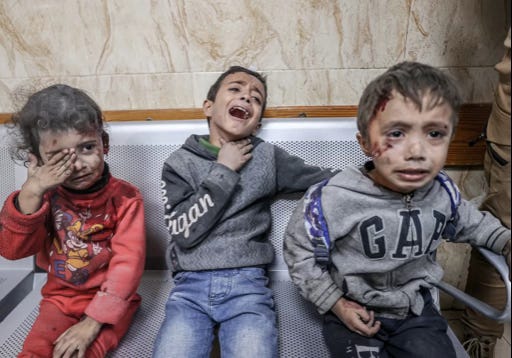My son Jackson’s blog is where he publishes his original poetry, which I highly recommend. He published this piece today with an accompanying note on the poetics of atrocity. I’m reproducing it here with his permission.
Note: I’ve chosen to republish this piece, which I’m not sure was as understood as I had hoped when I wrote it last month. It is the duty of artists not merely to rebel against evil in abstract or idealistic terms, but to interpret its atrocities directly. Such we see in the poetry of Wilfred Owen, or Los Desastres de la Guerra of Francisco de Goya. Photography and videography are invaluable for tribunals and historians. But the war against evil is fundamentally spiritual, and art is the expression of the spirit. And language is, above all artistic media, particularly effective in awakening and impressing conscience, as it proceeds from the human spirit with the least interposition of extraneous interpreters, allowing for greater precision in the expression of feeling. This may be easily demonstrated by example. If you wish to communicate your thoughts to someone, and are given the choice of doing so via painting, sculpture, music, or language, which would you choose?
It is the capacity of language to decipher our spirits directly - absent the power of telepathy - which makes it the supreme arbiter of conscience, and ultimate moral reference in the arenas of culture and religion.
It lays a duty on all writers to act as the interpreters of atrocity.
Sinite pueros venire ad me, et nolite eos vetare
Israel's fire had eaten his hair and skin,
Shredded his legs, burnt out his eyeless and mouthless face.
Cries tore his throat with alien horror, and I
Thought: It is his soul, crying with horror within
His annihilated flesh, crying for grace –
Crying: let me live, O God, letting this body die.





Very moving
One of my favourite artists, asideWilliam Blake and Rembrandt, is Kathe Kollwitz. I have books of her work, she was a great artist, had no choice but to be political, and express her horror at wars waged, namely the first world wars, where she tragically lost a son, then a grandson. Another I discovered who produced 'war art' was Graham Sutherland. How can any creative ignore the world they are aware of, it's nice to have pretty pictures as well, but being creative is a responsibility in interpreting the world for good and for ill.